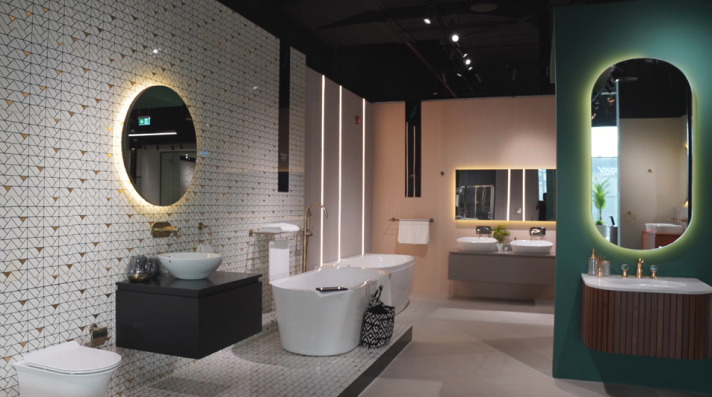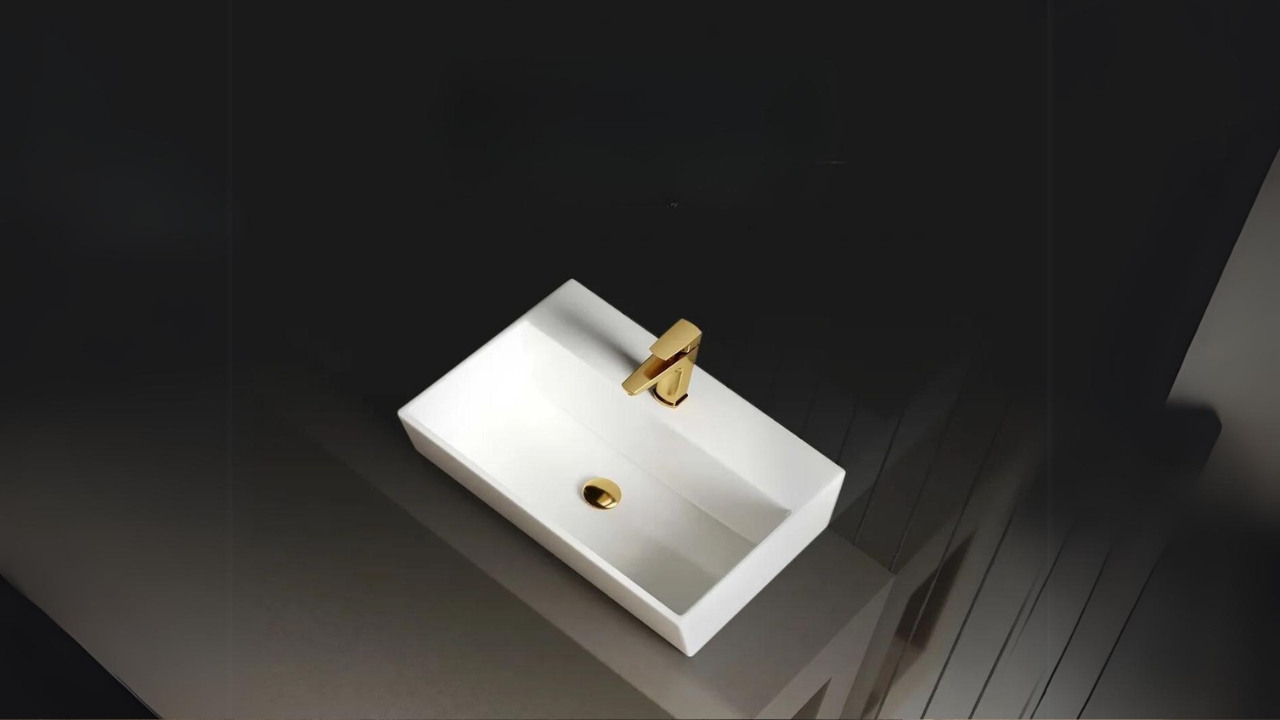Faucets are an integral part of our daily lives, from washing our hands to cooking. However, these essential fixtures are prone to corrosion in humid environments which can mar their aesthetic value and also affect their functionality over time. Leaks, discolorations as well as poor water flow may result ultimately leading to heavy expenses on repair and replacement kits. This article outlines some preventive measures for faucet corrosion in humid conditions so that your taps keep working for you efficiently through the years.
What is Faucet Corrosion?

Credits: Canva
Corrosion is the process by which metals deteriorate due to chemical reactions with their environment. For instance, faucets rust and get spoiled when they come into contact with moisture, oxygen and other agents present in the atmosphere. In highly moist air where humidity is a problem, it happens at an accelerated rate due to saturation levels. The consequences include visible damages such as; rusting, staining or pitting on the faucet’s surface.
Why Humidity Causes Corrosion
Humidity refers to the amount of water vapour present in the air. High humidity levels lead to condensation, where moisture collects on surfaces like faucets. This constant exposure to moisture accelerates the oxidation process, causing metal components to corrode. Additionally, minerals and salts in the water can contribute to corrosion by forming deposits that further damage the faucet's surface.
Prevention Strategies For Faucet Corrosion

Credits: Jaquar
1. Choose the Right Material
Stainless Steel

Credits: Jaquar
In humid areas, stainless steel works effectively because it does not corrode easily due to its inherent resistance against corrosion properties. Chromium content creates a protective layer on its exterior against rusting hence it should be made known whether ‘stainless steel’ or ‘corrosion-resistant’ is written on the taps before purchasing.
Brass
Brass is also resistant to corrosion. It can withstand dampness better than many other metals. Nevertheless, it requires extra care in order to prevent its corrosion by coating or treating brass taps. These measures prolong their lives and preserve their aesthetic appeal.
2. Apply Protective Coatings
Clear Sealer
A clear sealer can be applied to your faucet to act as a barrier between the metal and water thus preventing corrosion which may be caused by direct contact with moisture. This protection has to be renewed regularly in order to remain effective.
Specialized Coatings
These types of coatings are specially made for faucets used under humid conditions. These protect from water further and could last for a long time thereby assuring that you only have to use this process once after every three months. The services of an expert would be ideal for applying these kinds of layers of protection so that they become very effective.
3. Regular Cleaning and Maintenance

Credits: Canva
Routine Cleaning
To avoid corrosion on faucets it is important that you keep them clean at all times, and take care of any dirt, oil or moisture from them using a soft cloth and mild detergent- harsh chemicals or abrasive materials damage them in addition, dry afterwards thoroughly before leaving them alone since there might still be some traces of water left in between crevices or joints thereby causing some inconveniences later on.
Inspection and Maintenance
Often when the earliest signs of rusting or wear appear during regular checks; discolourations might appear, and leakages could occur too leading up to all these issues which ought never reach your doorstep. Henceforth, one must carry out preventive maintenance such as tightening loose parts etc., replacing worn-out rubber washers so as not to reduce the life span of your gear considerably so keep checking for little things like this all the time.
4. Proper Installation

Credits: Canva
Sealant Application
Use high-quality sealants to keep water from getting into areas under your faucets during installation. This will reduce the chances of corrosion due to trapped moisture. Make sure you apply the sealant uniformly and it should dry up before using.
Professional Installation
For those who feel they are not competent enough in establishing their own faucets, one can seek a plumber’s assistance. Leaks and other causes of corrosion can only be avoided through proper installation procedures. It is important to involve a professional who will install the faucet correctly with all connections properly tightened.
5. Control Humidity Levels
Use Dehumidifiers
In places where humidity levels remain high most of the time, dehumidifiers can be highly effective solutions. The dehumidifier reduces moisture in the air hence minimizing condensation on different surfaces including the sink. This significantly minimizes the risk of corrosion amongst other moisture-related issues.
Improve Ventilation
Humidity control relies heavily on good ventilation facilities in place in your bathroom or kitchen. To prevent moisture accumulation, ensure that there is sufficient airflow within these two rooms. Exhaust fans and open windows are popular ways of reducing humidity which helps keep your sink dry.
6. Choose Quality Products

Credits: Jaquar
High-Quality Faucets
It is important to go for high-quality faucets because this can make a big difference when it comes to their durability and resistance against rusting. Consider manufacturers known for crafting these items with materials that last long enough as well as paying attention to the workmanship employed while manufacturing them. Despite being more expensive than ordinary ones, such taps usually perform better and have longer life spans.
7. Regularly Replace Worn Parts

Credits: Canva
Cartridge Replacement
The temperature flow through your faucet is regulated by its cartridge. Chips wear off cartridges over time requiring replacement because this leads to leakage thus enhancing exposure to water. Regular replacement of the cartridge is done to prevent corrosion and maintain good performance.
Washer Replacement
Faucet washers are prone to wear as time goes by; leading to leakage and increasing exposure to moisture. To ensure that the faucet operates smoothly, it is crucial that worn-out washers are replaced on a regular basis. By so doing, you will be able to keep your faucets working properly for long.
Conclusion
To avoid corrosion in damp surroundings, select suitable materials, apply protective coatings, and establish effective maintenance techniques. In this case, choose stainless steel or treated brass which are corrosion-resistant materials; clean and inspect them regularly; control humidity levels around such sinks all these should help keep your taps as good as new with high reliability.
At Jaquar we realize that humid environments can sometimes be problematic hence we offer quality products that are designed for such. These faucets are made of premium materials with various features that make them more durable and rust-resistant. We provide Jaquar’s elegant and enduring solutions for bathrooms or kitchens whether one wants modern sleek designs or classic finishes.
Browse through our broad collection of faucets ranging from luxury alternatives to designer taps until you get what suits your house best. Trust our products at Jaquar because they never disappoint in terms of quality satisfaction through their professional team dedicated to giving reliable services at the highest level possible. Therefore feel free to call us today and let us know what you want so we advise you accordingly before considering our superior bathroom solutions.
Faqs
1. What causes faucet corrosion in humid environments?
Constant exposure to moisture and high humidity levels are the main causes of faucet corrosion in humid areas. A faucet’s surface can be condensed by the saturated air full of water vapour hence rusting its metallic part. This increases the rate of corrosion causing it to become rusty, discoloured, and deteriorate. Moreover, mineral and salt deposits in the water contribute to the production of corrosion.
2. How can I prevent corrosion on my faucets?
To prevent corrosion on your faucets, consider the following strategies:
- Choose Corrosion-Resistant Materials: Opt for faucets made from stainless steel or treated brass, as these materials are more resistant to corrosion.
- Apply Protective Coatings: Use clear sealers or specialised coatings to create a barrier between the metal and moisture.
- Regular Cleaning: Clean your faucets regularly with a soft cloth and mild detergent, and ensure they are dried thoroughly after cleaning.
- Control Humidity: Use dehumidifiers and improve ventilation in areas with high humidity to reduce moisture buildup.
- Proper Installation: Apply sealant around the base of the faucet and consider professional installation to prevent leaks and trapped moisture.
3. How often should I clean and maintain my faucets to prevent corrosion?
Cleaning and inspecting your faucets should take place at least once every month. Regularly cleaning them with a soft cloth and mild detergent will help remove any dirt, grime or moisture that may cause rusting. In addition, check if there is any wearing off or damage on your faucets such as rust or leakage; deal with these problems as quickly as possible. Regular maintenance like loose components tightening, and replacing worn-out washers or cartridges would also assist in preventing corrosion hence making faucets live longer.
4. Are there any specific features I should look for in faucets to prevent corrosion?
Yes, when choosing faucets to prevent corrosion, consider the following features:
- Material: Select faucets made from stainless steel or treated brass, as these materials offer better resistance to corrosion.
- Protective Coatings: Look for faucets with protective coatings or finishes that enhance their resistance to moisture and environmental factors.
- Cartridges and Washers: Choose faucets with high-quality cartridges and washers that are designed to withstand moisture and wear.
- Aerators: Faucets with built-in aerators can help reduce the risk of corrosion by providing a splash-free flow and filtering out debris.
5. How can I tell if my faucet is already corroding, and what should I do?
Rust spots, discolouration, pitting or peeling on the surface of a faucet indicate corrosion. In case you notice any of these signs, corrective measures have to be taken immediately so as not to cause further damage. For mild corrosion, clean the affected area with a soft cloth using a mild detergent then apply a protective coating. If there is extensive corrosion or leaking from your tap, you may have to replace it or seek assistance from a professional plumber. Regular maintenance coupled with the prompt response towards rust manifestations in your taps will result in an extended lifespan for them.


